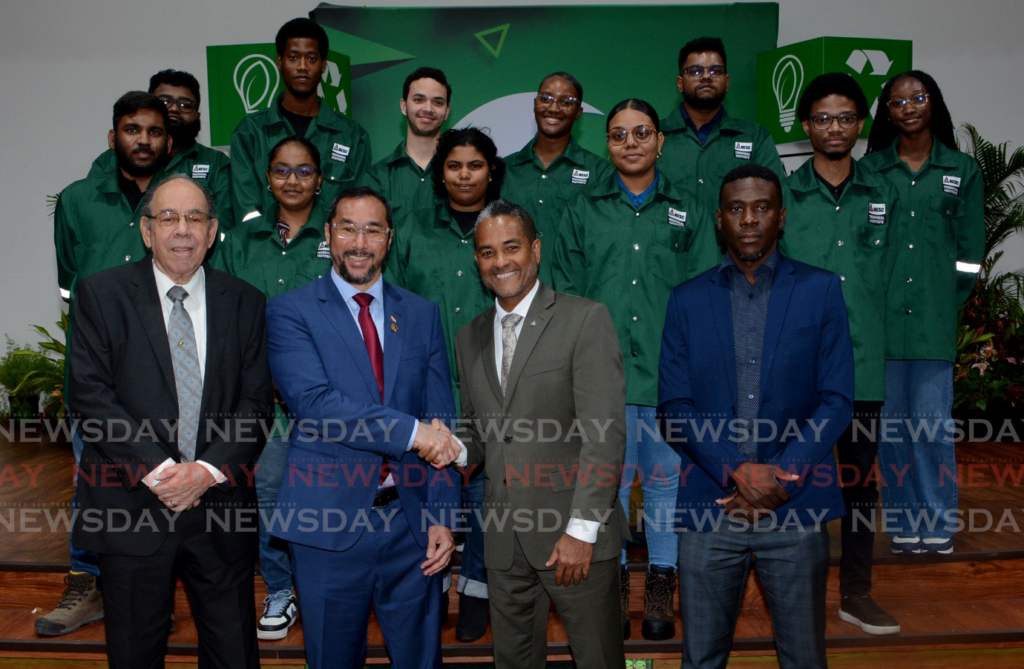Young: Buying bunker fuel from Jamaica a good deal

and Ryan Hamilton-Davis
MINISTER of Energy and Energy Industries Stuart Young has sought to clarify recent news of a deal with Jamaica's refinery Petrojam Ltd by Paria Fuel Trading to secure marine fuel for bunkering in Trinidad and Tobago, saying the country has always imported fuel for marine sale.
Young spoke to reporters on February 3 after the launch of a National Energy Skills Centre Technical Institute (NESC-TI) programme in renewable energy. He said the only thing new about the arrangement is that it brokered a deal to obtain the fuel from Petrojam.
"All this transaction is, we're currently finalising the negotiation to purchase about 500,000 barrels of marine fuel which Paria has been purchasing.
"It is a promotion of our bilateral relationship with Jamaica of which I am very proud, because they're a close partner of ours, as well as Caricom. This is what Caricom is meant to be. So all we're doing is ensuring the principles of Caricom are carried out."
He said this came after some two years of talks with Jamaica's Minister of Science, Energy, Telecommunications and Transport, Daryl Vaz.
"We were importing marine fuel before, but buying it from international suppliers, so when Jamaica came to me two years ago and said to me, 'Can we find a way?' I said, 'Okay, let us open the commercial discussions. Because if there's a deal to be had to be beneficial to us, to be able to purchase from Jamaica at a price cheaper than the international market, that benefits them and us, we will. That is what it is."
He said the fuel bought from Jamaica would be sold at a profit to vessels that enter TT's waters.
"So it is a net foreign-exchange earner and a fraction – 500,000 barrels – compared to 17 million that Paria purchases a year."
Responding to critics, Young reiterated the Petrotrin refinery was closed down in 2018 because it was haemorrhaging money, with government having to write off $12 billion in losses at the time of the closure.
"We could not refine this product in a profitable manner (like) in the way we are purchasing and selling it now."
Asked to clarify further, Young said Petrojam's 38,000 barrel-per-day (bpd) output is a simpler operation and commercially simpler to run than Petrotrin's 175,000 bpd output.
"Remember, we had reached a stage in our production that started in the 2010-2015 period where, unfortunately, our domestic production had dipped below that point and we had to be purchasing. By the time the refinery was preserved and closed in 2018, we had to be importing about 100,000 barrels of oil a day to keep the refinery going.
"Work that out. Today the price of oil might be US$80, 80 by 100,000, that's US$8 million a day, and then when you put it in the refinery, it is refining at a loss. So you're losing on every barrel of oil you refine. That's the state we had reached. That's why the losses had started to be about $2 billion a year."
Further knocking critics, Young said: "Just for the record, for those who are trying to water it down, we have a trade surplus in our trading with Jamaica, with hundreds of millions of dollars in TT's favour. So please, allow us to continue our Caricom initiatives to the benefit not only to TT – because the deal makes sense for TT – but also to the benefit of our Caricom neighbours."
According to a Jamacia Observer article on February 2, the deal will see Petrojam supply nearly one million barrels of very low-sulphur fuel oil (VLSFO) and high-sulphur fuel oil (HSFO) to TT for US$90 million. It said between 60,000 and 90,000 barrels of oil will be sent to TT monthly, with the first shipment having already arrived on January 29.
However, a Paria statement later that day gave much lower figures for the deal. It said the preliminary arrangement with Petrojam was a six-month contract for VLSFO with a maximum total volume of 540,000 barrels at an approximate cost of US$50.2 million, which will be determined by prevailing international pricing. It also said the first shipment, 50,000 barrels, arrived on February 1.
"Confidential negotiations are ongoing with Petrojam, and Paria will continue to seek opportunities for not only its own continued profitability, but for the benefit of the citizens of TT, and the region."
Lee: It should be the other way around
Pointe-a-Pierre MP and shadow minister for the ministry of energy David Lee, in a phone conversation with Newsday, described the development as “hurtful” for the people of TT.
“Jamaica’s refinery is now supplying fuel to TT. This is after this government has closed down and abandoned our refinery. We are an oil-producing country and now we are dependent on Jamaica for fuel security. That is a tragedy in itself.”
He added that the country would have to take its own foreign exchange (forex), which is in short supply, to buy fuel from Jamaica and other countries around the world.
“Petrotrin was always a forex earner, where we would buy oil, refine it and then sell it to Jamaica. Now it is the other way around, with Jamaica supplying TT from their refinery and it is not an oil-producing country.
"The government should be ashamed of what is happening right now."
He added that Jamaica would also supply TT with bitumen, one of the key ingredients in road development and repair. He added that the Petrotrin refinery used to supply TT with bitumen.
“We used to get the bitumen as a by-product of the operations from the refinery. We would give it to Lake Asphalt, who would then mix it with other materials to repair our roads. That is why you are seeing that now, our roads are in a horrendous state.”

Comments
"Young: Buying bunker fuel from Jamaica a good deal"